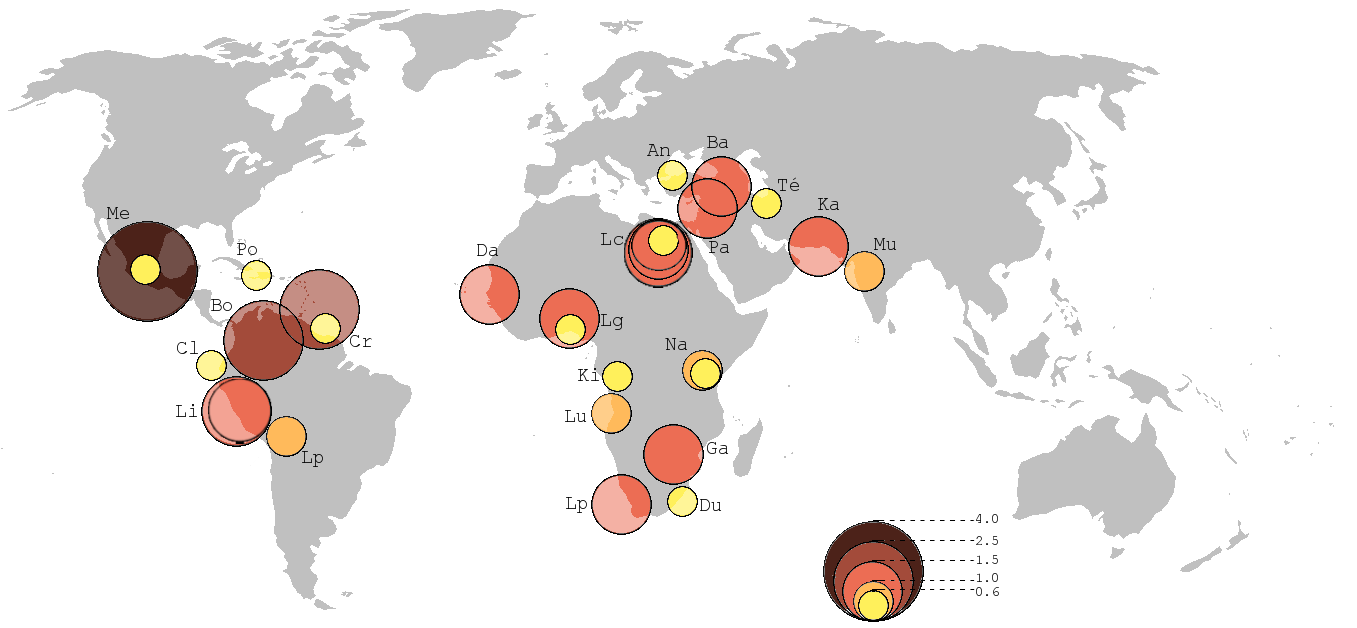The very definition of a slum in our society tells us that it is an entity to be removed or treated/beautified. The problem therefore arises from the fact that there is no acceptance for a space called slum in the urban sprawl of the supposedly better off society. There is somehow no logic that can be seen in the amount of articles that spam the internet with the number of plans to “eradicate” slums or help the “underprivileged”.Its therefore clear that it is treated like a parasite in the urban culture. what it needs is more economic management and policies . If it could be accepted as another part of the urban space that will continue to exist rather than looking at it as a parasite that needs to be removed, it would be a good start to solve the real issues that does exist in a slum.
a map below shows the amount of slums in the world. It would be futile to think, anybody could remove them from the growing urban scenario.

Now, to begin with the basics, according to the definition of a slum,A slum is a heavily populated urban informal settlement characterized by substandard housing and squalor.Here, we can safely say that the biggest problem is not the informal settlement , maybe substandard housing is a problem, but the biggest is the squalor.Squalor is the state of being extremely dirty and unpleasant, especially as a result of poverty or neglect.This results in epidemic and other fatal conditions.This can be resolved with management of the economic reforms for the people in slums to bring about better standard of living as compared to the current and education about the value of basic sanitation.
There is a reason which cause these informal settlements to grow in Mumbai. It is largely people migrating from rural areas in search of a dream and better economic stability.The growth of the city of Mumbai and the slums have developed together organically.

The lack of civic amenities in rural area as compared to urban areas can explain why people migrating from rural areas are unaware of the possibilities of better sanitation facilities as apposed to the urban people who demand it as their birth right.This is common sense, but the most overlooked point in understanding the working of a slum.It is important to understand where these people come from, what is their nature and pattern of thinking if we are designing habitable living condition in our slum part of the urban society.There is also lack of knowledge to optimize resource and manage their micro economy to contribute to the macro economy.There is one good example where a citizen of India, went about educating about bank accounts to these people in a certain region, and how it bought about small changes in the way people managed their money.This could possibly lead to a better economic level with time.
http://aeon.co/video/society/banking-on-change-a-short-film-about-microloans/
Another point to keep in mind is that one slum won’t be the end of it for one city. Even in the city of Mumbai, according to recent records , there are four more new slums ready to compete with the size of the infamous Dharavi slums.

There fore, the system of economic management and education must be a parameter which can evolve and adapt to the various slums growing rapidly ,accommodating people coming from various locations.This is where sustainability of an economic educational and managerial system becomes important.
if we are thinking about architectural ways to bring about these concepts to life, then maybe concepts of creating a culture where a space for education and enforcing the ideas practically could be plugged into these areas.There could be plug-in of civic infrastructure which visually/graphically educates the importance of economic management.And a space where the culture of opening a bank account and managing money happens. There are banks catering to the needs of people in reduced circumstances, but they need to be located in an area easily accessible to them and available for them alone.
Apart from economic management , there is also a need to emphasize the necessity of sanitation.Here, again, when we look at this issue in the micro scale, Having actually seen the slums, it is observed that their homes are kept clean and the front yard of their houses are washed everyday. The things that need to be cleaned are the huge amount of garbage piles and other dirt surrounding the places where they stay.It is clear that these settlements happen in areas which are ignored in the urban spaces.This could be around garbage piles that are thrown from each district or around sewage lines or railway tracks.These are usually urban voids created by a society in the urban infrastructure. These spaces are neglected until the areas surrounding it get developed and suddenly the land value of these neglected voids increases.This is also one of the reason, that , slums are sought to be eradicated . The developers watch this land like hungry dogs and suddenly the space where these people have made their homes becomes the parasite. Although there is no justification to these settlements,it does not seem completely fair.This is another reason why there is need of economic education and stability.The government body needs to regulate rules to keep every part of the city clean.Planned dump yards, sewage lines and spaces around railway tracks are essential part of city planning which need to be immediately implemented in the city.And this is the responsibility of the government body and not of the people staying in the informal settlement.It is a misconception that the people staying there have absolutely no clean habits. In fact, these people have optimized their resources by using what ever is available to them to its maximum potential. It is a pity that the lack of clean water and a clean surrounding which are responsibilities of the government to every citizen is not provided to them.
Therefore, with better regulations for basic facilities from the government and educating the people in reduced circumstances to make better economic decisions might start to resolve the most basic necessity of humans i.e., food and habitable shelter.There are many other problems surrounding the informal settlement like security in general, security of women and children ,child labour and many more. But , education is definitely a start to broaden the horizon of the people and make them aware of the opportunities available to them with the skills needed for it.


